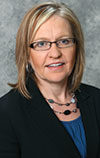I can’t say there is one time I haven’t come away without one new or interesting point.
Recently, I had the opportunity to participate in a leadership business summit called Leadercast, featuring exceptional national and global leaders as keynote speakers sharing their knowledge of leadership within business, sports, education, international affairs, religion, etc.
The program was based in Atlanta, Georgia, but was available via simulcast to more than 100,000 people from communities and companies who signed on to hear some once-in-a-lifetime presentations.
Leadercast features sports great
Football season is fast approaching, and a highlight of this year’s Leadercast program was the opportunity to hear from sports great and current Denver Broncos quarterback Peyton Manning. Manning is the NFL’s only five-time MVP and a 14-time Pro Bowl selection.
He was the first overall draft pick when he entered the NFL in 1998, signed by the Indianapolis Colts. Manning has thrown the most touchdown passes in league history in addition to ranking second all-time in wins by a quarterback, completions and passing yards.
His list of football accolades is long, as well as his list of giving back to his community and nation through charities and his PeyBack Foundation.
In agriculture, we are familiar with uncertainty dealing with changing weather and fluctuating markets. Manning is also familiar with uncertainty.
Following his 2010 season, when he endured what could have been a career-ending neck surgery, he took the 2011 season off to heal. When he returned in 2012, he led his new team, the Denver Broncos, to the playoffs and in 2013 to the Super Bowl.
This uncertainty was highlighted when he commented, “Brave ones better be prepared to be game changers.” He emphasized that “if you wait for others to initiate change, you’re following, not leading” and concluded this point saying, “One needs courage as much as you need competence.”
Peyton encouraged leaders to evaluate every relevant possibility during the decision-making process. “What you do with what you don’t know can be more important than anything else you do as a leader,” he said.
His Leadercast presentation focused on seven game-changing points which he has adopted and encourages other leaders to adopt. From his comments, I have added relevance to how these game changers may be adopted in agriculture.
Peyton Manning’s seven game-changing points
1. Learn to thrive being uncomfortable. “A quarterback doesn’t have a perfect pocket on every play,” he explained. To be prepared, Peyton says he will practice awkward throws just to be ready for anything.
In your agricultural business, what might you do to be prepared for the unexpected? Is there something you should pursue to diversify your operation or move you out of your comfort zone?
2. Devote yourself to intense preparation. Preparing yourself for your role and implementing it to the best of your ability is essential to increase the talent and preparation of a Super Bowl quarterback. Is there additional preparation you should be doing as leader of your farm/ranch or for your employees?
3. Invest in a coach. Peyton, along with his brother Eli, also a famous NFL quarterback, still communicate and learn from their early quarterback coach. This coach knows the brothers so well, he is comfortable with them and will point out what others may not, explained Peyton.
How does this fit in your agricultural business? Is there an experienced farmer/rancher or feedlot owner you can seek out as a mentor that will be straightforward with you and not just tell you what you want to hear?
4. Find a way to instill trust in others. Manning said, “My linemen need to trust I’m going to be 6.5 yards behind them and deliver the ball in 2.9 seconds.” In your agricultural operation, what level of trust do you have? Do you and your employees know each other well enough to build a level of trust, especially in a crisis situation?
5. Bravely adjust to new realities. Be aware you may need to make adjustments as needed. Peyton talked about how he adjusted his game both moving to a new team and his style of play after his major injury.
He believes one must learn from weaknesses in order to build upon strengths. What do you need to adjust in your agricultural business? Could changes increase profitability, expand your customer base or improve the quality and yield grade of the cattle you market? (just to name a few potential options)
6. Become a master observer. “I devour game film,” Manning said. “I set individual goals that will have an impact on our team’s success.”
In your agricultural business, what are you doing to look outside the box, set new goals or build a team with your employees?
7. Understand the sustained power and influence that flows from relationships with other people. On the football field, Peyton and his teammates have the swagger of winners, but he cautions leaders to remember that your greatest accomplishments are not made alone.
In conclusion, Peyton Manning challenged the global viewing audience with this statement, “What can we do today to make ourselves better than we were the day before?” ![]()

-
B. Lynn Gordon
- Ag Leadership Specialist Assistant Professor
- SDSU Extension and Department of Teaching, Learning and Leadership
- Email B. Lynn Gordon







